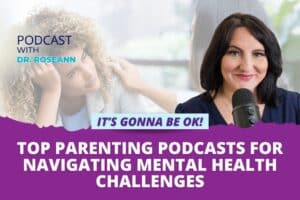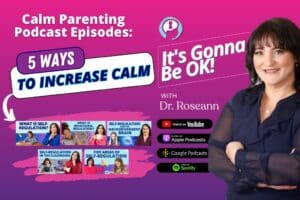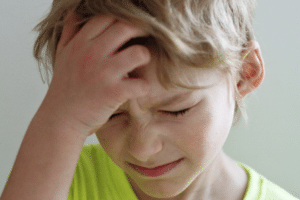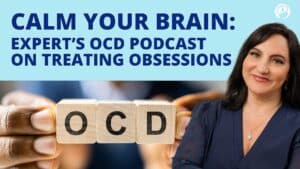Parenthood can be quite a journey, and it becomes even more challenging when your child faces the struggles of mental health conditions like Obsessive Compulsive Disorder (OCD) and Attention Deficit Hyperactivity Disorder (ADHD).
These conditions often manifest as obsessive and intrusive thoughts and difficulties with attention and executive functions, respectively. But the good thing is that there are alternative treatments beyond the conventional methods.
What is Attention Deficit Hyperactivity Disorder (ADHD)?
Attention-Deficit Hyperactivity Disorder (ADHD) is a neurodevelopmental condition characterized by persistent difficulties with attention, hyperactivity, and impulsivity. Individuals with ADHD often struggle with maintaining focus, staying organized, and completing tasks, which can significantly affect their daily lives, academic performance, and social interactions.
Inattention may manifest as difficulty sustaining attention to details, following through on tasks, or listening attentively, while hyperactivity and impulsivity may lead to restlessness, fidgeting, interrupting others, or difficulty waiting one's turn.
ADHD typically emerges in childhood and can continue into adolescence and adulthood. While the exact cause of ADHD remains under investigation, natural treatments such as behavioral therapies, PEMF, and neurofeedback are available to help children and teens manage symptoms and improve their overall functioning. Early diagnosis and intervention are crucial in providing support and improving the quality of life for those with ADHD.
What is Obsessive-Compulsive Disorder (OCD)?
Obsessive-Compulsive Disorder (OCD) is a chronic mental health condition characterized by a constant cycle of obsessions and compulsions. Obsessions are intrusive and anxiety-provoking thoughts, images, or urges, while compulsions are repetitive behaviors or mental acts performed in response to these obsessions, despite being excessive and irrational.
This disorder significantly disrupts daily life, as children and teens with OCD often struggle to maintain normal routines and may experience a profound sense of distress. Although many are aware of the irrationality of their compulsions, they find it challenging to control them.
OCD typically emerges in adolescence or early adulthood and can persist throughout a person's life but can also be seen in young children too. Natural treatment options, including exposure and response prevention psychotherapy, are available to help individuals manage their symptoms and regain control over their lives without taking medications.
Co-occurring Symptoms of OCD and ADHD
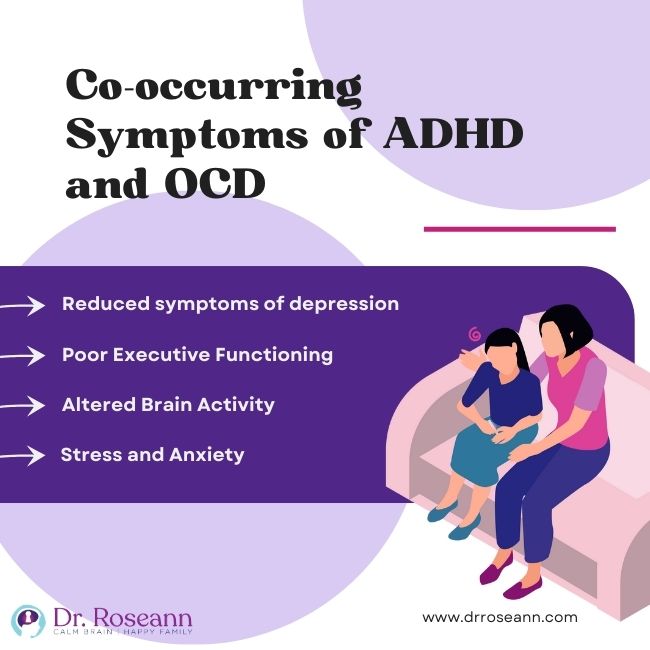
OCD and ADHD are distinct mental health conditions, each with its own characteristics and diagnostic criteria. However, some similarities and overlaps between these conditions can sometimes lead to confusion or misdiagnosis.
It's not uncommon for a child to have OCD and ADHD simultaneously. This co-occurrence can complicate diagnosis and treatment because the symptoms of one condition can sometimes mimic the signs of the other (Cabarkapa et al., 2019).
In such cases, a thorough assessment by mental health professionals is crucial to make a correct diagnosis between these two different disorders. Here are some of the similar symptoms of ADHD and OCD:
Inattention and Impulsivity
OCD and ADHD can involve difficulties with attention and impulse control, although the nature of these difficulties is different. In ADHD, individuals often struggle with sustaining attention, staying organized, and controlling impulsive behavior. In OCD, individuals may have intrusive and obsessive thoughts that are difficult to ignore, leading to compulsive behaviors as an attempt to alleviate anxiety.
Poor Executive Functioning
Executive functions are cognitive processes that help us plan, organize, initiate tasks, shift between activities, and control our behavior. Deficits in executive function can be seen in both ADHD and OCD. In ADHD, these deficits are a core part of the diagnosis, while in OCD, they can manifest as difficulties in breaking the cycle of obsessions and compulsions.
Altered Brain Activity
Studies have shown that both OCD and ADHD are associated with alterations in brain activity, particularly in regions related to attention, impulse control, and emotional processing. However, the specific patterns of brain activity and the areas affected can differ between the two conditions. These differences can be seen on a QEEG Brain Map.
Stress and Anxiety
Children with OCD and ADHD often experience heightened stress and anxiety disorders. In ADHD, this can be due to the challenges of managing daily tasks and responsibilities. In OCD, it's typically a result of the distress caused by obsessive thoughts.
Disadvantages of Medical Treatment for OCD and ADHD
Traditionally, medical practitioners have turned to medications such as Selective Serotonin Reuptake Inhibitors (SSRIs) for OCD and stimulant medication for ADHD. While these treatments may address some symptoms, they often leave parents and children dealing with unwanted side effects and concerns about long-term health problems. Therefore, they should not used as a first-line treatment.
To put it bluntly, conventional treatments are akin to using a band-aid on a broken bone. They may provide temporary relief, but they don't get to the root of the issue. OCD and ADHD are not simple health problems.
These are mental health conditions that involve intricate brain activity. It's time to consider a treatment plan that addresses these different conditions on a deeper level. An OCD or ADHD medication won't cut it.
Focusing on behavioral support and gaining coping skills are critical components of lifelong success.
Holistic Approach to OCD and ADHD Treatment
Enter the holistic approach—a comprehensive method that treats the whole individual. It recognizes that OCD and ADHD affect not just one part of the brain, but a complex interplay of attention and executive functions.
Holistic treatments encompass various strategies, aiming to nurture mental health conditions in a more natural and balanced way. Here are some of the most effective natural solutions to OCD and ADHD:
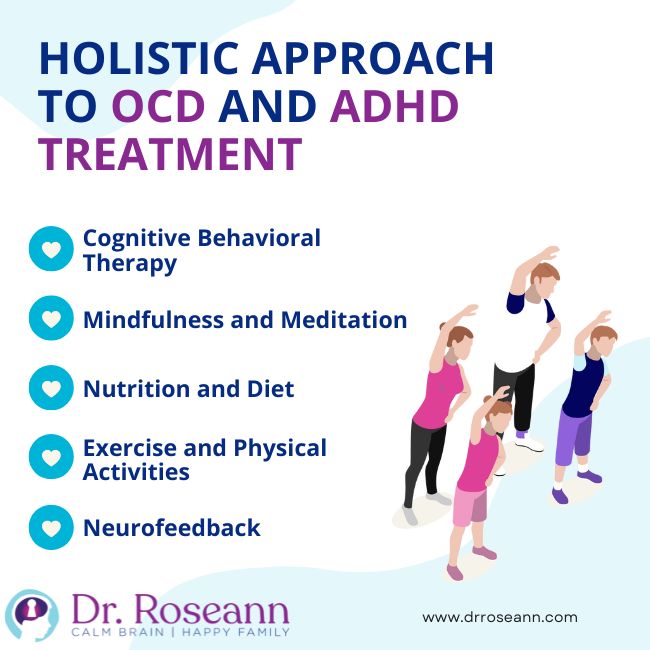
Cognitive Behavioral Therapy
Cognitive-behavioral therapy (CBT) is a highly effective therapeutic approach for individuals dealing with OCD and ADHD. In the case of OCD, CBT often involves Exposure and Response Prevention (ERP).
ERP helps individuals confront their obsessive thoughts and gradually reduce the compulsive behaviors that follow. Through cognitive restructuring, OCD patients can gain new perspectives on their obsessions, reducing anxiety and improving their ability to manage unwanted thoughts.
For ADHD, CBT techniques like psychoeducation, time management, and goal-setting assist children in improving attention, impulse control, and organization skills. CBT equips ADHD kids and teens with practical strategies to cope with symptoms, fostering a better quality of life, and can be a cornerstone in the treatment of both OCD and ADHD (Guzick et al., 2017).
Mindfulness and Meditation
Mindfulness and meditation have proven to be invaluable tools in the effective treatment of OCD and ADHD. These practices help individuals, including people with OCD, become more aware of their obsessive thoughts and compulsions. For people with ADHD, mindfulness cultivates focus and emotional regulation, addressing those intrusive thoughts head-on.
Nutrition and Diet
Nutrition plays a pivotal role in managing OCD and ADHD symptoms. It's not just about what you eat. It's about fueling your brain. Incorporating foods rich in omega-3 fatty acids and whole grains can provide a stable source of energy for children with ADHD and help alleviate some of the obsessions and compulsions common in OCD. Magnesium supplementation can greatly help too.
Exercise and Physical Activities
Physical activity is more than a means to burn off excess energy. It's a natural mood enhancer and a powerful way to manage mental health disorders. Regular exercise has been shown to reduce ADHD symptoms and improve overall well-being. It's like giving your brain a workout.
Neurofeedback
By monitoring and providing real-time feedback on brainwave patterns, neurofeedback helps individuals recognize and regulate their brain activity, improving self-regulation and reducing symptoms associated with OCD (Hammond, 2003).
While individual responses vary, neurofeedback can be a valuable adjunctive treatment option. It complements other therapies in comprehensive treatment plans, like the BrainBehaviorResetTM Program.
Its personalized approach tailors training to an individual's specific brain wave patterns and symptoms, potentially offering relief and enhanced management of these challenging conditions, particularly ADHD and OCD symptoms.
Success Stories of Holistic Treatment
Let's explore some real-world success stories of OCD and ADHD in some children whose parents opted to use natural solutions, particularly BrainBehaviorReset™, over conventional treatments. Here’s how Emily and Jake triumphed over OCD and ADHD, respectively.
Emily, plagued by obsessive thoughts and compulsions, found relief through holistic treatments. Cognitive-behavioral therapy helped her understand her obsessions and compulsions, and mindfulness meditation gave her tools to manage them. A balanced diet and exercise routine further supported her journey to mental health.
On the other hand, Jake’s ADHD made it challenging to focus and control his impulses. His parents chose a holistic approach, integrating regular exercise into his routine and practicing mindfulness together. Jake's brain activity became more balanced, and he developed better attention and emotional regulation.
Finding the Right Approach for Your Child
In the domain of mental health treatment, there's no one-size-fits-all solution. Traditional treatments have their place, but they often come with a list of unwanted side effects. Holistic approaches to OCD and ADHD offer a ray of hope for those seeking a more natural, comprehensive path to mental health.
So, as you embark on this journey, remember that it's about nurturing the whole person—mind, body, and soul. Obsessive thoughts and attention deficits may seem overwhelming, but with the right approach, you can find the balance and harmony you and your child deserve.
Parent Action Steps
- Educate yourself about OCD and ADHD.
- Consult a qualified healthcare professional for an accurate diagnosis.
- Explore appropriate treatment options
- Establish a structured daily routine with consistent schedules.
- Offer emotional support, encouragement, and open communication
- Foster independence by teaching self-management skills.
- Actively participate in the therapy.
- Establish a home environment that minimizes distractions for children with ADHD.
- Encourage a balanced diet, regular exercise, and sufficient sleep.
- Consider joining support groups or organizations dedicated to kids’ mental health.
- Be patient with your child.
- Recognize and celebrate your child's accomplishments.
- Be a strong advocate for your child's needs at school and in the community.
- Answer this quiz to know if your child has ADHD
- Take the Solutions Matcher for a personalized treatment for your child.
Citations
Cabarkapa, S., King, J. A., Dowling, N., & Ng, C. H. (2019). Co-Morbid Obsessive–Compulsive Disorder and Attention Deficit Hyperactivity Disorder: Neurobiological Commonalities and Treatment Implications. Frontiers in Psychiatry, 10. https://doi.org/10.3389/fpsyt.2019.00557
Guzick, A. G., McNamara, J. P. H., Reid, A. M., Balkhi, A. M., Storch, E. A., Murphy, T. K., Goodman, W. K., Bussing, R., & Geffken, G. R. (2017). The link between ADHD-like inattention and obsessions and compulsions during treatment of youth with OCD. Journal of Obsessive-Compulsive and Related Disorders, 12, 1–8. https://doi.org/10.1016/j.jocrd.2016.11.004
Hammond, D. C. (2003). QEEG-Guided Neurofeedback in the Treatment of Obsessive Compulsive Disorder. Journal of Neurotherapy, 7(2), 25–52. https://doi.org/10.1300/j184v07n02_03
Always remember… “Calm Brain, Happy Family™”
Are you looking for SOLUTIONS for your struggling child or teen?
Dr. Roseann and her team are all about solutions, so you are in the right place!
There are 3 ways to work with Dr. Roseann:
You can get her books for parents and professionals, including: It’s Gonna Be OK™: Proven Ways to Improve Your Child’s Mental Health, Teletherapy Toolkit™ and Brain Under Attack: A Resource For Parents and Caregivers of Children With PANS, PANDAS, and Autoimmune Encephalopathy.
If you are a business or organization that needs proactive guidance to support employee mental health or an organization looking for a brand representative, check out Dr. Roseann’s media page and professional speaking page to see how we can work together.
Dr. Roseann is a Children’s Mental Health Expert and Therapist who has been featured in/on hundreds of media outlets including, CBS, NBC, FOX News, PIX11 NYC, The New York Times, The Washington Post,, Business Insider, USA Today, CNET, Marth Stewart, and PARENTS. FORBES called her, “A thought leader in children’s mental health.”

She is the founder and director of The Global Institute of Children’s Mental Health and Dr. Roseann Capanna-Hodge. Dr. Roseann is a Board Certified Neurofeedback (BCN) Practitioner, a Board Member of the Northeast Region Biofeedback Society (NRBS), Certified Integrative Medicine Mental Health Provider (CMHIMP) and an Amen Clinic Certified Brain Health Coach. She is also a member of The International Lyme Disease and Associated Disease Society (ILADS), The American Psychological Association (APA), Anxiety and Depression Association of America (ADAA) National Association of School Psychologists (NASP), International OCD Foundation (IOCDF) International Society for Neurofeedback and Research (ISNR) and The Association of Applied Psychophysiology and Biofeedback (AAPB).
© Roseann-Capanna-Hodge, LLC 2023
Disclaimer: This article is not intended to give health advice and it is recommended to consult with a physician before beginning any new wellness regime. *The effectiveness of diagnosis and treatment vary by patient and condition. Dr. Roseann Capanna-Hodge, LLC does not guarantee certain results.






